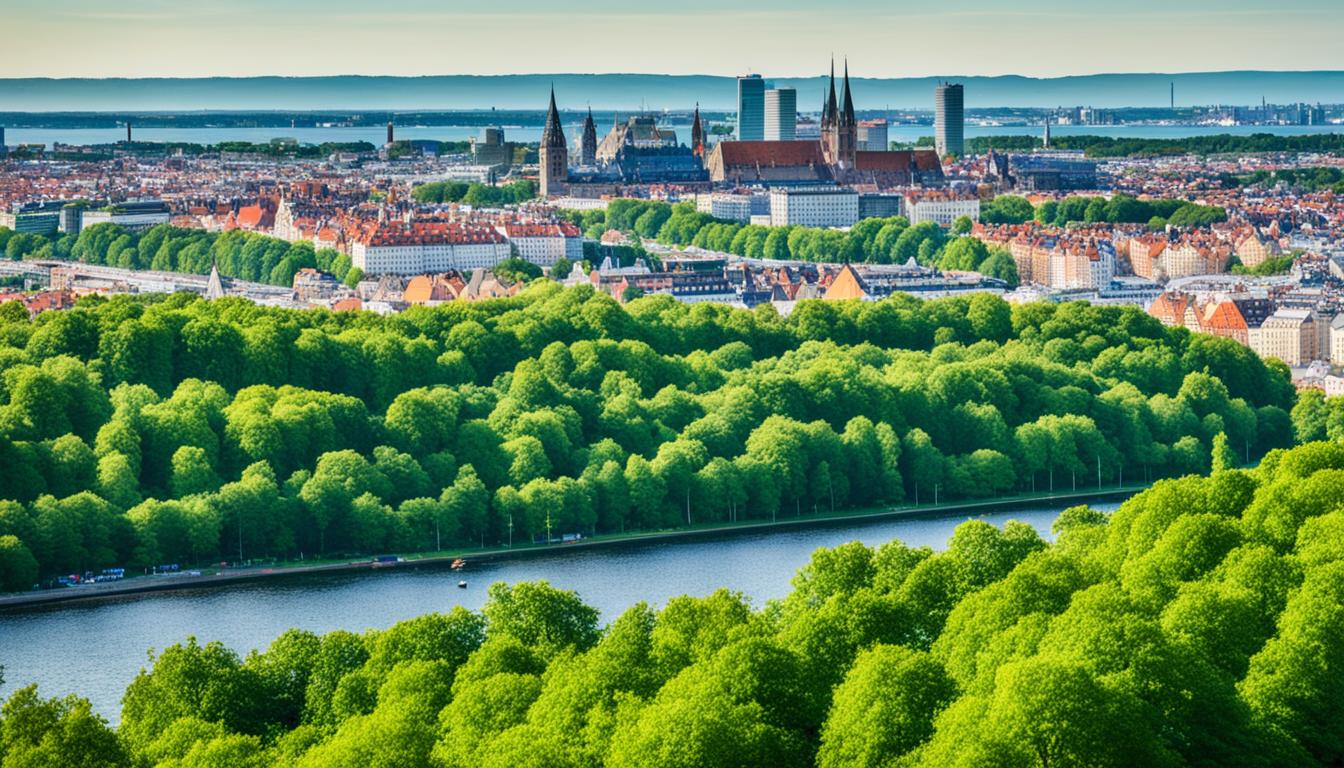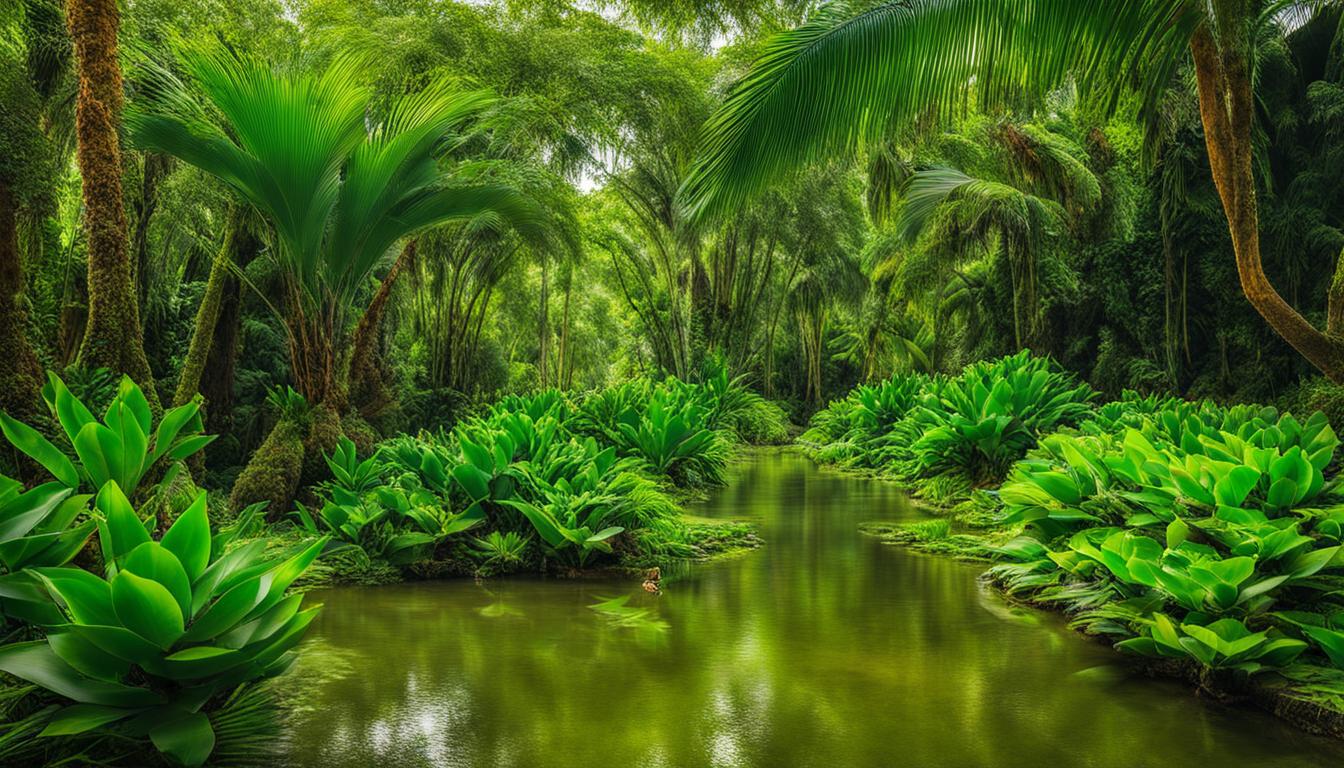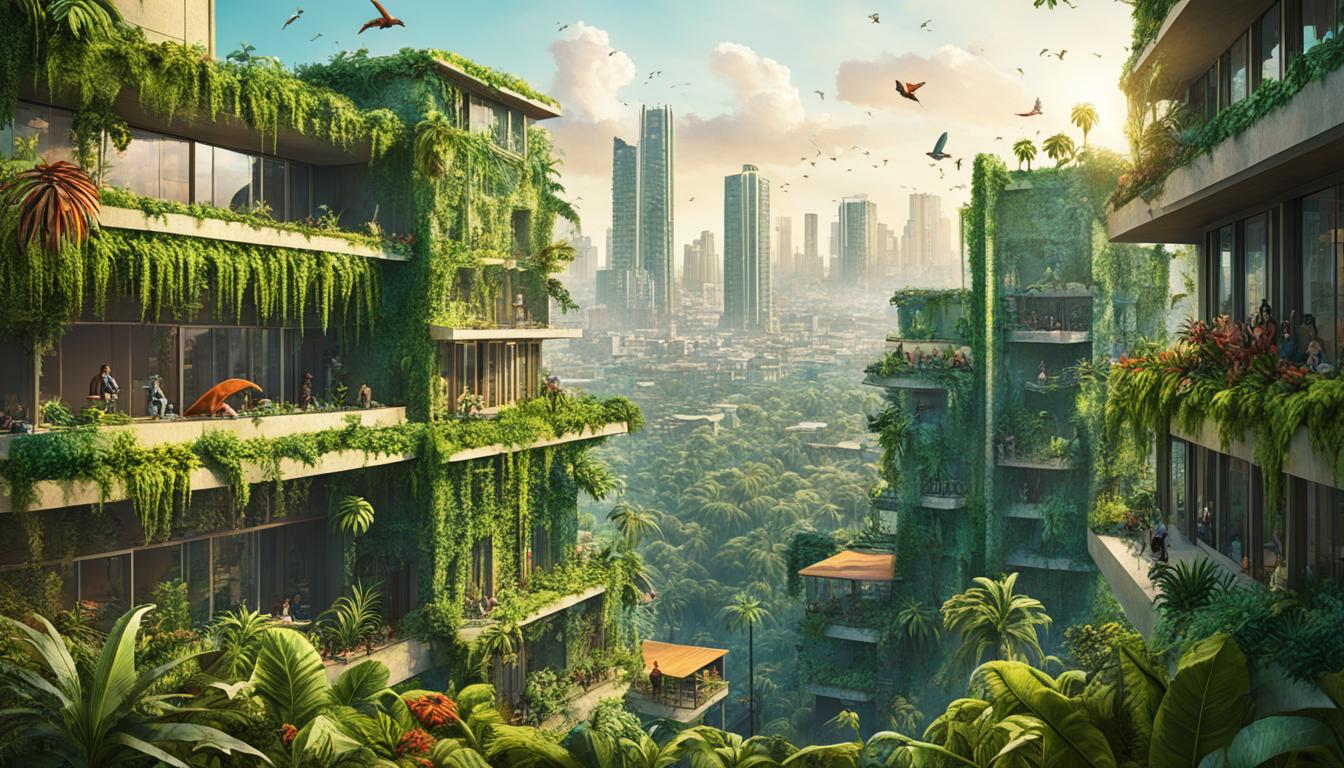Djibouti Biodiversity and the Built Environment
Welcome to our article on Djibouti’s fascinating biodiversity and its intricate relationship with the built environment. Djibouti, located in the Greater Horn of Africa, may be a small country, but it boasts a remarkable variety of ecosystems and wildlife despite its harsh climate and limited natural resources.
In Djibouti, you can find a diverse range of vegetation types, including woodland, bushland, herbaceous grassland, and mangrove forests along the coast. However, the country faces significant challenges such as deforestation, overgrazing, and the impact of climate change, which have led to a reduction in vegetation cover. Additionally, Djibouti grapples with environmental issues like soil salinization, soil erosion, and marine pollution.
Despite these challenges, both the government and various organizations are actively involved in managing and conserving Djibouti’s biodiversity and natural resources. Efforts are underway to protect and increase the number of protected areas and to ensure the preservation of endangered species and forest resources. Furthermore, initiatives are being taken to address issues related to climate change, sustainable development, and environmental management.
Key Takeaways
- Djibouti possesses diverse ecosystems and wildlife despite its harsh climate and limited resources.
- It faces challenges such as deforestation, overgrazing, and climate change, resulting in a reduction in vegetation cover.
- Efforts are underway to protect biodiversity, increase the number of protected areas, and preserve endangered species and forest resources.
- The government is actively involved in environmental and natural resource management through legislation, policies, and institutional structures.
- Djibouti is also focusing on climate change adaptation, sustainable development, and the implementation of green and grey infrastructure.
Stay tuned as we delve into the various aspects of environmental management, biodiversity conservation, climate change adaptation, and sustainable development in Djibouti. Join us on this journey to discover the unique challenges and remarkable initiatives that shape the relationship between Djibouti’s biodiversity and the built environment.
Environmental and Natural Resource Management in Djibouti
Djibouti, like many countries, faces several challenges in environmental and natural resource management. The government has taken proactive steps to address these issues and ensure the sustainable development of the nation. Initiatives have been implemented to combat overgrazing, deforestation, and marine pollution, which threaten the delicate balance of Djibouti’s ecosystems.
The legislative and institutional structures in place reflect Djibouti’s commitment to protecting biodiversity and forests. Environmental policies, legislation, and treaties serve as a framework for sustainable management practices. Furthermore, various institutions, non-governmental organizations (NGOs), and donor organizations collaborate to support conservation efforts throughout the country.
The Government’s Initiatives
The Djiboutian government recognizes the importance of environmental management and has devised a range of initiatives to tackle pressing issues. These initiatives include:
- Implementation of regulations to address overgrazing, which poses a threat to vegetation and wildlife.
- Development of strategies to combat deforestation and encourage sustainable forest management.
- Establishment of marine protection areas to mitigate the adverse effects of pollution and preserve the diverse marine ecosystem.
These efforts demonstrate Djibouti’s commitment to environmental conservation and highlight the government’s dedication to safeguarding the country’s natural resources for future generations.
“Our environment is a precious asset that we must protect. Through collective action and sustainable practices, we can ensure the well-being of our ecosystems and the prosperity of our people.” – Government Spokesperson
Collaborative Conservation
Environmental management in Djibouti extends beyond the government’s efforts. The nation benefits from the collaboration between various stakeholders, including institutions, NGOs, and donor organizations. Their collective work strengthens the capacity for conservation and promotes sustainable natural resource management.
The table below highlights some of the vital organizations involved in environmental and natural resource management in Djibouti:
| Organization | Role |
|---|---|
| National Environment Agency (NEA) | Responsible for environmental monitoring and regulation. |
| Wildlife Conservation Society (WCS) | Focuses on biodiversity conservation and research. |
| World Wildlife Fund (WWF) | Collaborates with local partners to protect endangered species and conserve habitats. |
| African Development Bank (AfDB) | Provides funding for sustainable development projects, including environmental initiatives. |
These organizations play a crucial role in supporting Djibouti’s environmental management efforts, ensuring the effective implementation of policies and the success of conservation projects.
Overall, Djibouti’s commitment to environmental and natural resource management is evident in its government’s initiatives and collaborative partnerships. By prioritizing conservation and sustainable practices, Djibouti aims to preserve its unique ecosystems and ensure the long-term well-being of its people.
Conservation of Biodiversity in Djibouti
Djibouti, located in the Greater Horn of Africa, is home to a diverse range of flora and fauna. However, the current status and management of natural resources, especially protected areas, pose a concern for biodiversity conservation in the country. Djibouti has limited protected areas, and these areas face various threats that endanger their existence.
The threats to protected areas in Djibouti include habitat degradation, drought, climate change, and invasive species. These factors contribute to the decline of biodiversity and put vulnerable species at risk. In order to safeguard the rich biodiversity of Djibouti, efforts must be made to increase the size and number of protected areas.
Furthermore, it is essential to prioritize the protection of endangered species and the sustainable management of forest resources. Biodiversity conservation efforts should not be limited to protected areas alone. Conservation initiatives outside of these areas are equally crucial for preserving the natural heritage of Djibouti.
“Conserving biodiversity in Djibouti is a collective responsibility that requires the collaboration of government bodies, NGOs, local communities, and international organizations.”
To effectively conserve biodiversity in Djibouti, stakeholders must work together to address environmental challenges and implement sustainable practices. This includes promoting sustainable land-use practices, restoring degraded habitats, and improving environmental education and awareness.
Priorities for Biodiversity Conservation in Djibouti
- Expand and establish more protected areas to preserve critical habitats
- Implement strict regulations and enforcement to combat habitat degradation and illegal activities
- Conduct research and monitoring to better understand Djibouti’s unique biodiversity and identify conservation priorities
- Support local communities in sustainable resource management and alternative livelihoods
- Collaborate with international organizations to access funding and expertise for biodiversity conservation projects
By prioritizing biodiversity conservation and sustainable practices, Djibouti can safeguard its natural heritage for future generations while promoting the well-being of its communities.
Threats to Biodiversity and Forest Conservation in Djibouti
Djibouti, like many other countries, faces a range of threats to its precious biodiversity and the conservation of its forests. These threats have both direct and indirect impacts on the natural resources and ecosystems of the country, posing significant challenges to its long-term sustainability.
Direct Threats
Direct threats to biodiversity and forest conservation in Djibouti are diverse and multifaceted. Some of the key direct threats include:
- Habitat degradation: The destruction and fragmentation of natural habitats reduce the availability of suitable environments for various plant and animal species. This is often driven by human activities such as deforestation, land conversion, and urbanization.
- Drought: Djibouti’s arid climate makes it susceptible to frequent droughts, jeopardizing the survival of many plant species and disrupting the delicate balance of ecosystems.
- Climate change: The adverse effects of climate change, such as rising temperatures and altered rainfall patterns, directly impact biodiversity and forest ecosystems. These changes can disrupt the life cycles of plants and animals, leading to reduced species diversity and extinction risks.
- Pollution: Pollution from various sources, including industrial activities and improper waste disposal, has detrimental effects on both terrestrial and marine environments. It contaminates ecosystems and poses threats to the health and survival of plant and animal species.
- Invasive species: The introduction of non-native species can have negative consequences for native flora and fauna. Invasive species often outcompete indigenous species for resources, disrupt natural ecosystems, and can even drive certain species to extinction.
Indirect Threats
In addition to direct threats, Djibouti also faces a range of indirect threats that exacerbate the challenges of biodiversity and forest conservation. These indirect threats include:
- Political instability: Instability in governance and conflicts can hinder effective environmental management and conservation efforts, diverting attention and resources away from biodiversity protection.
- Health issues: Public health concerns, such as the current COVID-19 pandemic, can divert resources and attention away from environmental conservation and stewardship.
- Population growth: Rapid population growth puts additional pressure on natural resources and ecosystems, leading to increased demand for land, food, and energy.
- Poverty: Poverty and economic challenges can often drive unsustainable resource exploitation and land-use practices, further threatening biodiversity and forest conservation.
- Lack of capacity: Limited institutional capacity, technological resources, and expertise pose significant obstacles to effective biodiversity and forest conservation efforts.
These threats collectively pose significant challenges to the biodiversity and forest resources of Djibouti. Addressing these challenges requires a comprehensive and integrated approach that combines conservation measures, sustainable land-use practices, and capacity building initiatives.
By prioritizing the protection and restoration of habitats, implementing climate change adaptation strategies, fostering international collaborations, and promoting sustainable development, Djibouti can safeguard its valuable biodiversity and ensure the preservation of its built environment for future generations.
Actions for Biodiversity Conservation in Djibouti
To ensure the long-term conservation of biodiversity in Djibouti, a range of actions must be taken. These actions are vital for promoting sustainable development and safeguarding the country’s unique ecosystems and natural resources. By taking proactive steps, Djibouti can build a future where biodiversity thrives hand in hand with human progress.
1. Promoting Political Stability
Political stability is essential for effective biodiversity conservation. By establishing stable governance and fostering collaboration between governmental bodies, Djibouti can create an environment conducive to conservation efforts. Political will and commitment are crucial in implementing protective measures and enacting sustainable policies.
2. Implementing Sustainable Land-Use Practices
Sustainable land-use practices play a pivotal role in preserving biodiversity. Djibouti should prioritize the adoption and enforcement of practices that promote responsible land management, including sustainable agriculture, reforestation, and watershed management. These practices help protect habitats, mitigate soil erosion, and support the natural regeneration of flora and fauna.
3. Increasing the Size and Number of Protected Areas
Expanding the network of protected areas is paramount in biodiversity conservation. Djibouti should identify and designate new protected areas, ensuring they represent a range of ecosystems and provide safe havens for threatened species. Additionally, existing protected areas should be effectively managed and adequately funded to maximize their conservation impact.
4. Implementing Climate Change Adaptation and Mitigation Measures
Addressing the impacts of climate change is essential for preserving biodiversity. Djibouti should implement measures to adapt to changing climate patterns, such as enhancing resilience to droughts and floods and developing climate-smart infrastructure. Simultaneously, mitigation efforts like promoting renewable energy and reducing greenhouse gas emissions contribute to both sustainable development and biodiversity conservation.
5. Combating Invasive Species
Invasive species pose a significant threat to biodiversity in Djibouti. The country should invest in robust monitoring programs, early detection systems, and effective eradication methods to combat invasive species. By preventing the spread of non-native species and restoring native habitats, Djibouti can protect its unique plant and animal diversity.
6. Enhancing Governmental and Institutional Capacity
Building the capacity of governmental and non-governmental institutions is essential for successful biodiversity conservation. Djibouti should invest in training programs, knowledge-sharing platforms, and resources to strengthen the skills and expertise of relevant stakeholders. By fostering a knowledgeable workforce, Djibouti can effectively address conservation challenges.
7. Promoting Education and Public Awareness
Education and public awareness play a crucial role in fostering a culture of biodiversity conservation. Djibouti should prioritize environmental education in schools, raise public awareness through campaigns, and engage local communities in conservation initiatives. By instilling a sense of environmental responsibility, Djibouti can create a sustainable future for both its people and its unique ecosystems.
8. Encouraging Transboundary and Cross-Border Approaches
Collaboration with neighboring countries and international partners is vital for effective biodiversity conservation. Djibouti should engage in transboundary and cross-border initiatives, such as joint protected area management and sharing of best practices. By working together, regional actors can address shared conservation challenges more effectively.
9. Enhancing Food and Water Security
Food and water security are closely linked to biodiversity conservation. Djibouti should prioritize initiatives that ensure sustainable agricultural practices, promote water conservation, enhance soil quality, and diversify food sources. By addressing food and water security, Djibouti can alleviate pressure on natural resources and support the long-term well-being of both communities and ecosystems.
By implementing these actions, Djibouti can pave the way for sustainable development and biodiversity conservation. Protecting the country’s rich natural heritage is not just crucial for ecological balance but also for the social and economic well-being of its people.
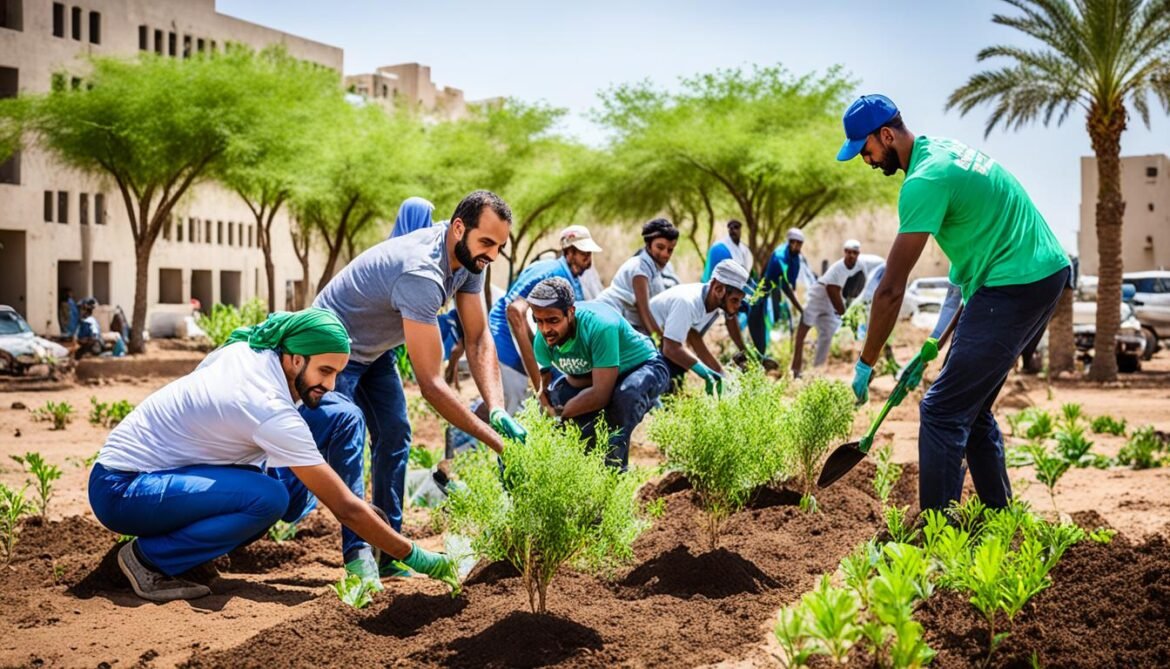
| Action | Description |
|---|---|
| Promoting Political Stability | Establishing stable governance to support conservation efforts |
| Implementing Sustainable Land-Use Practices | Adopting responsible land management practices to protect habitats |
| Increasing the Size and Number of Protected Areas | Expanding the network of protected areas for biodiversity preservation |
| Implementing Climate Change Adaptation and Mitigation Measures | Addressing climate change impacts and reducing greenhouse gas emissions |
| Combating Invasive Species | Preventing the spread of non-native species through monitoring and eradication |
| Enhancing Governmental and Institutional Capacity | Building expertise and strengthening institutions involved in conservation |
| Promoting Education and Public Awareness | Raising awareness and engaging communities in conservation efforts |
| Encouraging Transboundary and Cross-Border Approaches | Collaborating with regional partners for effective conservation |
| Enhancing Food and Water Security | Ensuring sustainable agricultural practices and water conservation |
Sustainable Development Ideas for Djibouti
In addition to biodiversity conservation, sustainable development plays a crucial role in shaping Djibouti’s future. With a focus on long-term well-being, several ideas can contribute to sustainable development in the country.
Promoting Ecotourism
One sustainable development idea for Djibouti is to promote ecotourism. Djibouti’s unique natural landscapes, such as its diverse ecosystems and stunning coastlines, have the potential to attract nature enthusiasts and adventure seekers. By developing sustainable tourism practices and protecting the environment from negative impacts, Djibouti can create economic opportunities while preserving its natural heritage.
Investing in Renewable Energy Production
Another essential aspect of sustainable development is investing in renewable energy production. Djibouti has abundant solar and wind resources, making it an ideal location for renewable energy projects. By harnessing these renewable sources, Djibouti can reduce its reliance on fossil fuels, promote clean energy alternatives, and mitigate the environmental impacts associated with traditional energy production.
Expanding the Fishing Sector
The fishing industry presents another avenue for sustainable development in Djibouti. With its strategic location along the Red Sea and the Gulf of Aden, Djibouti has the potential to develop a thriving and sustainable fishing sector. By implementing responsible fishing practices, supporting local fishermen, and establishing marine protected areas, Djibouti can ensure the long-term viability of its fisheries while safeguarding the marine ecosystem.
These sustainable development ideas not only provide economic opportunities but also contribute to the protection of Djibouti’s natural environment. By balancing development with the conservation of biodiversity and the built environment, Djibouti can foster a sustainable future for its people and ensure a harmonious coexistence with the natural world.
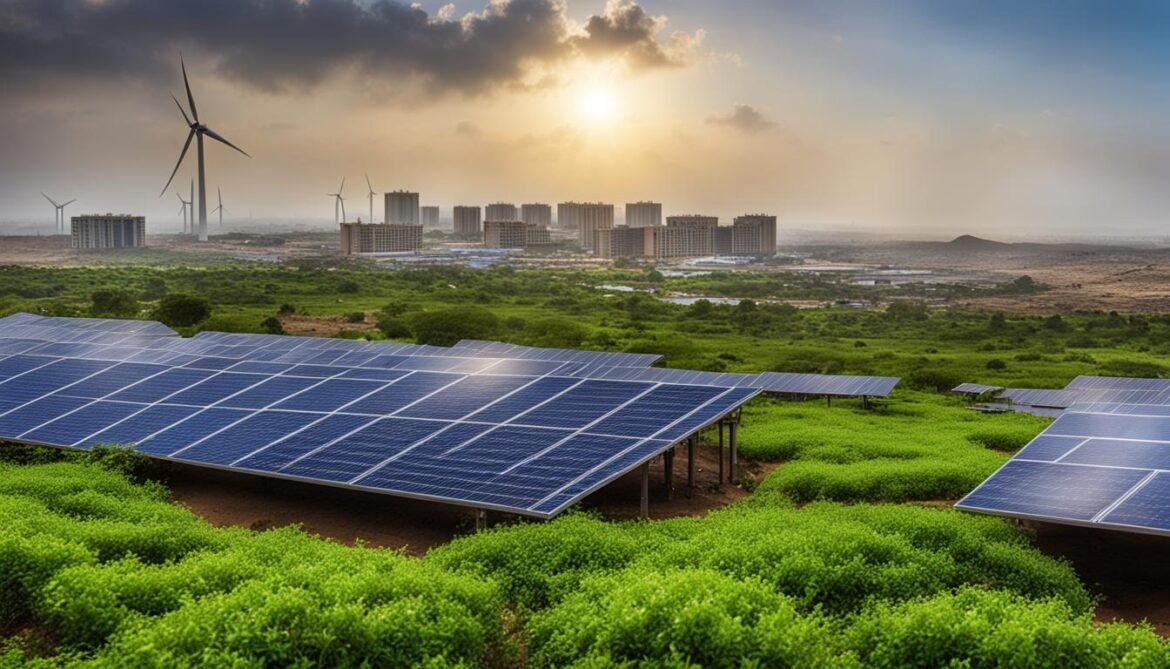
| Sustainable Development Ideas | Benefits |
|---|---|
| Promoting Ecotourism | – Economic opportunities |
| Investing in Renewable Energy Production | – Reduced reliance on fossil fuels – Promotion of clean energy alternatives |
| Expanding the Fishing Sector | – Economic growth in the fishing industry – Conservation of marine resources |
Djibouti’s Efforts in Climate Change Adaptation
Djibouti, located in the Greater Horn of Africa, is highly vulnerable to the impacts of climate change. The country experiences unpredictable rainfall, frequent droughts, and occasional floods, putting both communities and infrastructure at risk. To address these challenges, the Djiboutian government has undertaken various initiatives in climate change adaptation, with a focus on flood defense infrastructure.
One of the key steps taken by the government is the construction of flood defense infrastructure, including walls and dikes. These structures serve as protective barriers, safeguarding vulnerable communities from the destructive force of floods. By investing in flood defense infrastructure, Djibouti aims to mitigate the impact on neighborhoods, infrastructure, and agricultural land.
“The flood defense infrastructure in Djibouti has been instrumental in protecting our communities and minimizing damage to our vital resources. It has provided a sense of security and resilience in the face of climate change impacts.”
– Ministry of Environment and Sustainable Development, Djibouti
These efforts have shown success in reducing the vulnerability of communities to floods. The flood defense infrastructure helps prevent the displacement of people, destruction of homes, and disruption of livelihoods. By protecting the built environment, it also ensures the continuity of critical services and infrastructure.
Additionally, the flood defense infrastructure plays a crucial role in safeguarding agricultural land from flooding. This protection supports the agricultural sector, which is vital for food security and economic stability in Djibouti.
Benefits of Climate Change Adaptation Measures in Djibouti
The investment in climate change adaptation measures, particularly flood defense infrastructure, yields several benefits for Djibouti:
- Protection of vulnerable communities from flood-related damages and displacement.
- Preservation of infrastructure, including roads, buildings, and utilities.
- Mitigation of agricultural losses due to flooding, ensuring food security.
- Promotion of resilience in the face of climate change impacts, minimizing social and economic disruptions.
- Enhancement of the overall well-being and quality of life in Djibouti.
However, to ensure the long-term sustainability and resilience of Djibouti’s built environment and biodiversity, it is crucial to continue investing in climate change adaptation measures. This includes the maintenance and upgrading of existing flood defense infrastructure, as well as the implementation of additional measures to address ongoing and future climate change challenges.
| Climate Change Adaptation Measures | Benefits |
|---|---|
| Flood defense infrastructure | Protection of communities, infrastructure, and agricultural land from floods |
| Enhanced drainage systems | Improved management of stormwater and reduced risk of urban flooding |
| Water conservation and management | Sustainable use of water resources and reduced vulnerability to water scarcity |
| Climate-resilient agriculture | Adaptation of farming practices to changing climatic conditions, ensuring food security |
By prioritizing climate change adaptation, Djibouti can protect its communities, natural resources, and built environment from the adverse effects of climate change. These efforts will contribute to the overall resilience and sustainable development of the country, ensuring a prosperous future for generations to come.
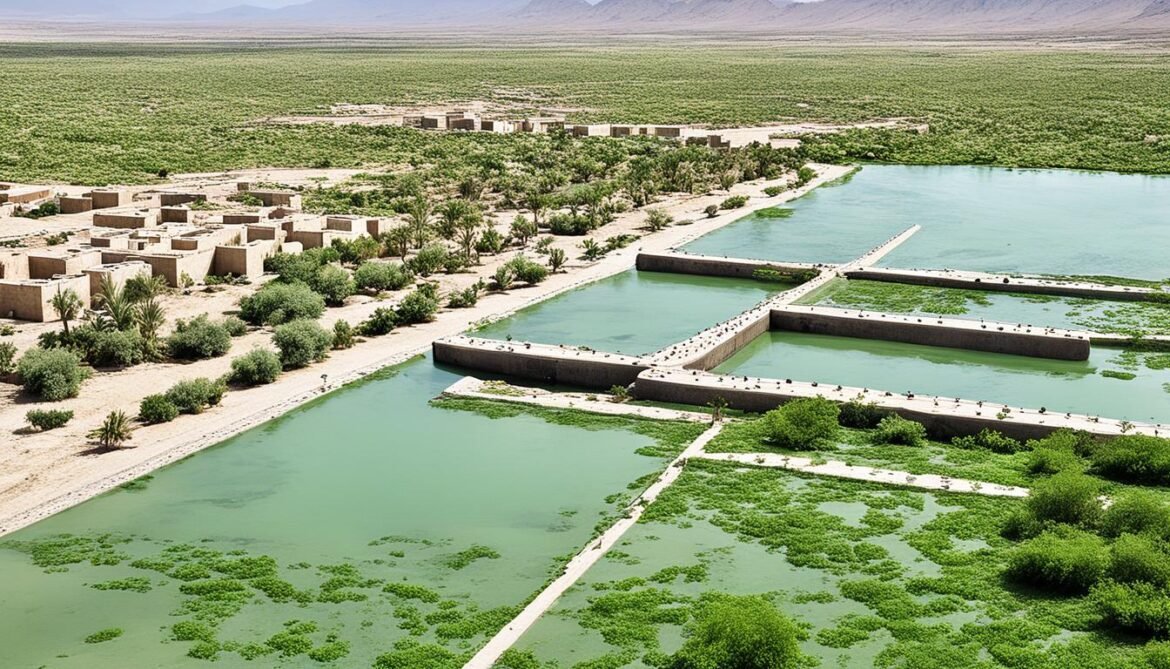
Green and Grey Infrastructure in Djibouti
Djibouti recognizes the importance of adapting to climate change and has implemented a comprehensive approach that combines both green and grey infrastructure. Green infrastructure involves utilizing natural or semi-natural systems to provide environmental benefits and ensure long-term sustainability. This includes initiatives like the restoration of mangrove forests, which act as natural buffers, reducing the impact of waves and flooding and protecting coastal areas from erosion.
On the other hand, grey infrastructure consists of man-made structures such as flood walls and dikes, which are designed to provide immediate protection against climate change impacts. These structures complement green infrastructure by offering additional resilience to extreme weather events and protecting critical infrastructure and communities.
By combining both green and grey infrastructure, Djibouti can effectively address the challenges posed by climate change while ensuring the resilience of its built environment. This integrated approach offers a cost-effective solution that not only enhances environmental protection but also safeguards the well-being of Djibouti’s population.
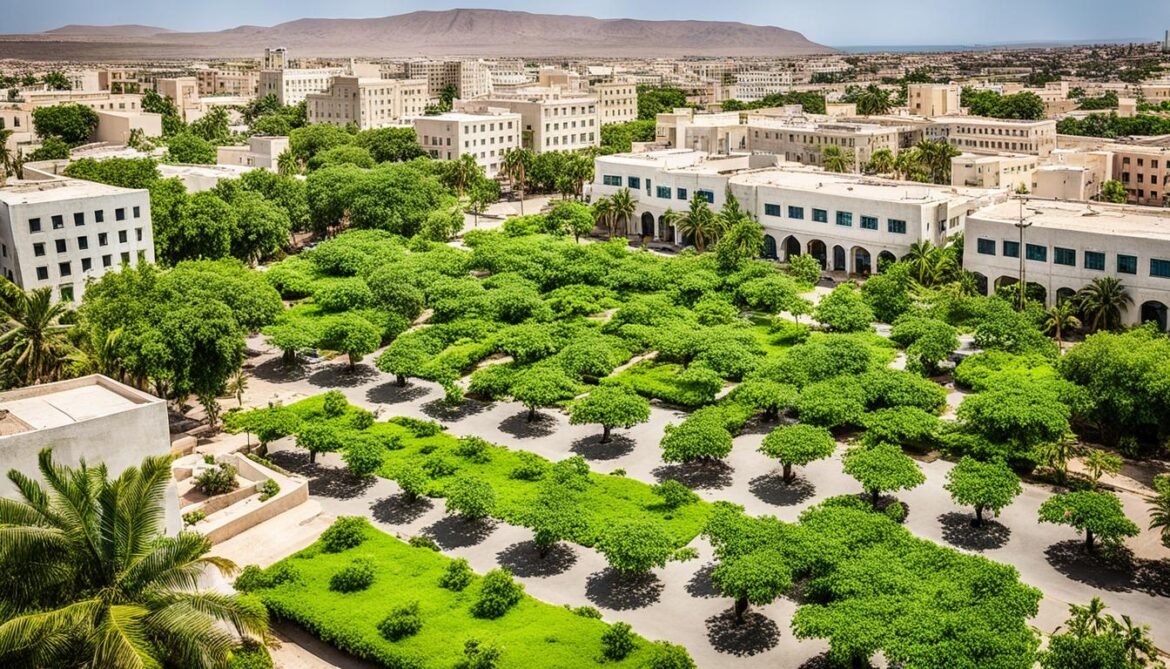
The Benefits of Green and Grey Infrastructure
The integration of green and grey infrastructure in Djibouti offers a range of significant benefits:
- Environmental Protection: Green infrastructure preserves and restores natural systems, contributing to the conservation of biodiversity, improving air and water quality, and promoting the sustainability of ecosystems. Grey infrastructure provides immediate protection against climate change hazards, safeguarding vulnerable areas and minimizing the potential for damage.
- Resilience and Adaptation: Green infrastructure enhances the ability of ecosystems to withstand and recover from climate-related events, such as floods and storms. Grey infrastructure reinforces this resilience by providing additional protection and ensuring the continuity of critical services.
- Sustainable Development: The combination of green and grey infrastructure promotes sustainable development by integrating environmental, social, and economic considerations. It balances the need for climate change adaptation with the preservation of natural resources and the well-being of communities.
“The integration of green and grey infrastructure in Djibouti is a forward-thinking approach that not only addresses the challenges presented by climate change but also promotes long-term sustainability.” – Environmental expert
A comprehensive approach that combines green and grey infrastructure allows Djibouti to achieve multiple objectives simultaneously. By investing in both natural and man-made systems, Djibouti can create a resilient and sustainable built environment while safeguarding its valuable natural resources.
| Green Infrastructure | Grey Infrastructure |
|---|---|
| Mangrove forest restoration | Flood walls and dikes |
| Wetland creation and protection | Stormwater management systems |
| Green roofs and walls | Sea defenses |
| Urban parks and open spaces | Water treatment plants |
Global Adaptation Efforts and Djibouti’s Role
Djibouti’s adaptation efforts align with global initiatives to address climate change impacts. The world is witnessing a significant increase in adaptation initiatives, with leaders committing to finance adaptation projects. Djibouti’s efforts contribute to these global strategies and are in line with the UN Decade on Ecosystem Restoration, which aims to prevent, halt, and reverse the degradation of ecosystems worldwide. The international community recognizes the importance of adaptation and is mobilizing resources to protect communities and the environment.
As part of the global adaptation efforts, Djibouti plays a vital role in implementing measures to mitigate climate change impacts and preserve its unique natural resources. The country actively engages in initiatives to restore and safeguard ecosystems, promoting sustainable development and resilience.
“The conservation of ecosystems is essential not only for the well-being of Djibouti but also for the global environment. Djibouti’s participation in the UN Decade on Ecosystem Restoration signifies its commitment to protect and restore ecosystems, contributing to a more sustainable and biodiverse planet.” – Jennifer Robinson, Environmental Expert
Djibouti’s participation in the UN Decade on Ecosystem Restoration demonstrates its dedication to global adaptation efforts and the preservation of biodiversity. The country recognizes the interconnectedness of ecosystems and understands that their restoration is crucial for the sustainability of natural resources, climate resilience, and community well-being.
The Role of Djibouti in Global Adaptation Efforts
Djibouti actively contributes to global adaptation efforts in various ways:
- Advocating for increased funding and support for adaptation projects at international forums
- Sharing expertise and knowledge on climate change adaptation and ecosystem restoration
- Collaborating with international organizations and neighboring countries on transboundary adaptation initiatives
- Implementing climate-smart strategies and practices in sectors such as agriculture, water management, and infrastructure development
Through these actions, Djibouti aims to strengthen the resilience of its ecosystems, communities, and built environment, while also contributing to global efforts in addressing climate change and promoting sustainable development.
Djibouti’s Contributions to Global Adaptation Efforts
| Contributions | Description |
|---|---|
| Advocacy | Djibouti actively participates in international forums to advocate for increased funding and support for adaptation projects. |
| Knowledge Sharing | The country shares expertise and knowledge on climate change adaptation and ecosystem restoration to facilitate global learning and collaboration. |
| Regional Cooperation | Djibouti collaborates with neighboring countries and international organizations on transboundary adaptation initiatives to address shared challenges. |
| Climate-Smart Strategies | Djibouti implements climate-smart strategies and practices in sectors such as agriculture, water management, and infrastructure development. |
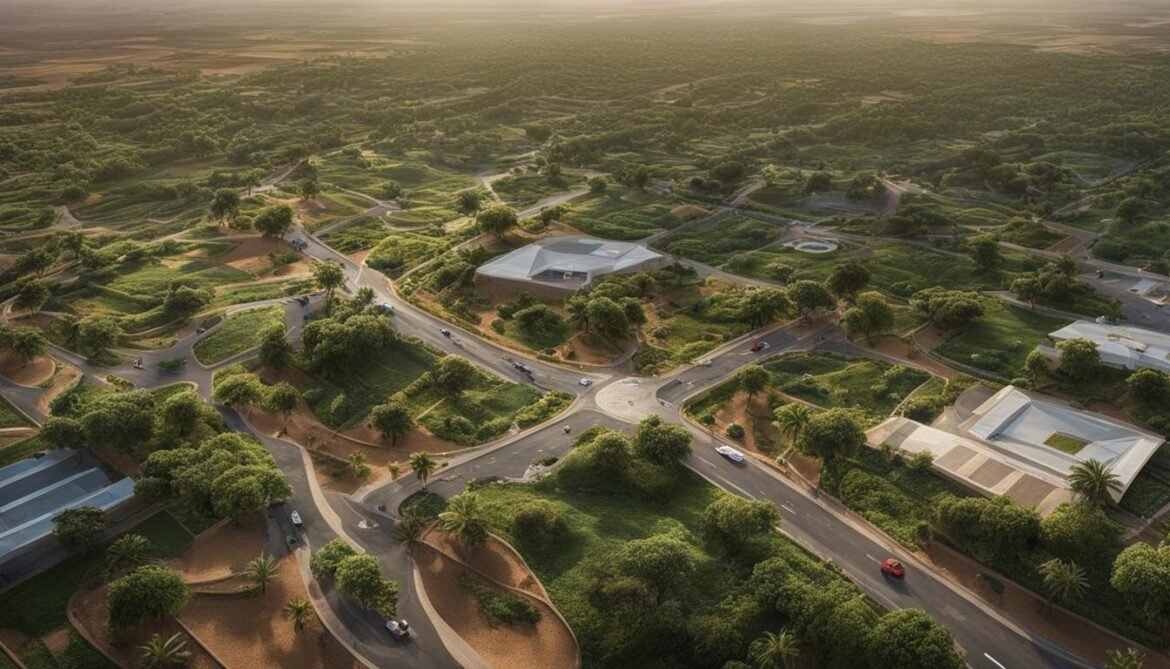
The Importance of Ecosystem-Based Adaptation
Ecosystem-based adaptation is a crucial strategy for addressing the impacts of climate change in Djibouti. The country is implementing various projects that focus on the restoration and preservation of ecosystems. These projects employ nature-based solutions, including mangrove planting and restoration, to enhance the resilience of ecosystems and protect communities from climate change-related hazards.
Ecosystem-based adaptation offers not only environmental benefits but also supports local economies by promoting activities such as ecotourism and sustainable fishing. Djibouti recognizes the value of nature-based solutions and is actively pursuing these approaches to adapt to climate change and safeguard its biodiversity and built environment.
“Ecosystem-based adaptation is a win-win approach that not only protects the environment but also enhances economic opportunities and resilience.” – Dr. Ahmed Saleh, Environmental Scientist
By investing in ecosystem-based adaptation, Djibouti can create a more sustainable future that benefits both people and the planet. This approach not only secures ecosystems but also strengthens communities and improves their quality of life.
To showcase the important role of ecosystem-based adaptation, here is an example of the benefits it provides:
| Benefits of Ecosystem-Based Adaptation | Examples |
|---|---|
| Enhanced Resilience | The restoration of mangroves protects coastal communities from storm surges and erosion. |
| Biodiversity Conservation | The rehabilitation of degraded ecosystems supports the survival of endangered species. |
| Economic Opportunities | Investment in ecotourism provides income for local communities while preserving natural resources. |
Ecosystem-based adaptation is a powerful tool that not only helps Djibouti cope with climate change impacts but also paves the way for sustainable development and the preservation of its unique biodiversity.
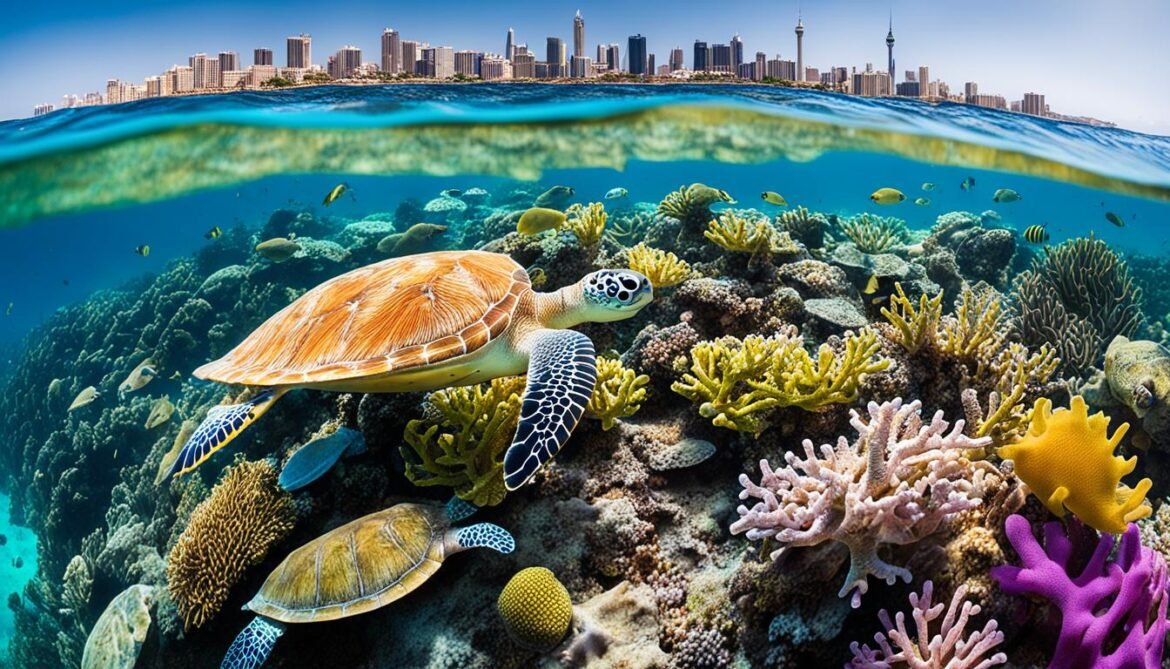
Conclusion
Djibouti’s biodiversity and the conservation of the built environment face significant challenges. However, through the collaborative efforts of the government and international organizations, strides have been made in addressing these issues. Initiatives such as biodiversity conservation, climate change adaptation, and sustainable development are being implemented to ensure the long-term well-being of Djibouti’s ecosystems and communities.
Continued investment in these efforts is crucial to overcome the challenges and create a harmonious balance between development and the preservation of Djibouti’s rich natural heritage. By prioritizing biodiversity conservation and integrating sustainable practices, Djibouti can safeguard its unique flora and fauna while promoting economic growth and social well-being.
The commitment to environmental stewardship and the adoption of nature-based solutions play a vital role in this endeavor. Djibouti’s journey towards maintaining the delicate balance between progress and conservation is a testament to its dedication to biodiversity preservation and the protection of the built environment.
FAQ
What are the main challenges in environmental and natural resource management in Djibouti?
The main challenges in environmental and natural resource management in Djibouti include deforestation, overgrazing, soil salinization, soil erosion, and marine pollution. These issues have led to a significant reduction in vegetation cover and pose a threat to biodiversity and ecosystems.
What is being done to protect biodiversity and forests in Djibouti?
The government of Djibouti has implemented legislative and institutional structures to protect biodiversity and forests. This includes the enactment of environmental policies, legislation, and treaties. Various institutions, NGOs, and donor organizations are also actively working towards conservation efforts.
What are the threats to biodiversity and forest conservation in Djibouti?
The threats to biodiversity and forest conservation in Djibouti include habitat degradation, drought, climate change, pollution, invasive species, political instability, health issues, population growth, poverty, and lack of capacity. These threats have a significant impact on the country’s wildlife and ecosystems.
What actions are necessary for biodiversity conservation in Djibouti?
To conserve biodiversity in Djibouti, actions such as implementing sustainable land-use practices, increasing the size and number of protected areas, combating invasive species, improving infrastructure, enhancing governmental and institutional capacity, promoting education, and enhancing food and water security are necessary.
What are some ideas for sustainable development in Djibouti?
Ideas for sustainable development in Djibouti include promoting ecotourism, investing in renewable energy production, and expanding the fishing sector. These initiatives not only provide economic opportunities but also protect the environment and contribute to overall sustainable development.
What efforts are being made in climate change adaptation in Djibouti?
Djibouti is taking action to adapt to climate change impacts, such as unpredictable rainfall, droughts, and floods. The government has constructed flood defense infrastructure, including walls and dikes, to protect vulnerable communities and mitigate the impact on infrastructure and farming.
What is the role of green and grey infrastructure in climate change adaptation in Djibouti?
Djibouti’s approach to climate change adaptation includes both green and grey infrastructure. Green infrastructure uses natural or semi-natural systems, such as mangrove forest restoration, to provide long-term sustainability. Grey infrastructure, such as flood walls and dikes, provides immediate protection. Combining both approaches ensures the resilience of Djibouti’s built environment.
How does Djibouti contribute to global climate change adaptation efforts?
Djibouti’s efforts in climate change adaptation align with global initiatives. The country’s actions contribute to strategies aimed at addressing climate change impacts. Djibouti’s efforts are in line with the UN Decade on Ecosystem Restoration, which aims to prevent, halt, and reverse ecosystem degradation worldwide.
What is the importance of ecosystem-based adaptation in Djibouti?
Djibouti recognizes the importance of ecosystem-based adaptation and is implementing projects focused on ecosystem restoration and preservation. These projects use nature-based solutions, such as mangrove planting and restoration, to enhance ecosystem resilience and protect communities from climate change-related hazards.
How can Djibouti achieve a balance between development and the preservation of biodiversity?
Djibouti can achieve a balance between development and the preservation of biodiversity by prioritizing biodiversity conservation, implementing sustainable practices, and integrating environmental considerations into development plans. It is crucial to invest in these efforts to ensure the long-term well-being of ecosystems and communities.



